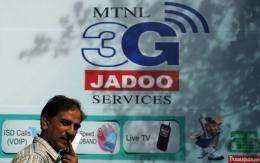3G auction earns India 14.6 billion dollars

India's auction of 3G bandwidth for mobile telephone services ended Wednesday, with final bids earning the government close to 15 billion dollars -- double its own estimate.
The provisional results were posted on the Department of Telecommunications website after 34 days of frenetic bidding that saw the price of a pan-India licence soar to more than 3.6 billion dollars -- way beyond the reserve price.
Nine cellular firms, including Indian market leaders Bharti Airtel and Reliance Communications, had participated in more than 180 rounds of bidding.
The provisional winning price for one slot of bandwidth to offer super fast third-generation services across India was 168.2 billion rupees (3.6 billion dollars), from a starting bid price of 35 billion rupees.
None of the bidding firms won 3G mobile spectrum in all 22 service areas up for grabs, but Bharti, Reliance and Vodafone Essar all won spectrum in the key -- and most expensive -- Delhi and Mumbai areas.
The government's provisional revenue from the sale was estimated at 677 billion rupees (14.6 billion dollars), which will go a long way to plug a yawning budget deficit.
The government had originally budgeted revenue of 350 billion rupees from the auction, which is seen as propelling India decisively into the Internet era.
There are nearly half a billion mobile phone subscribers in India, only a fraction of whom have access to the Internet via computers. New 3G networks will give people fast access to the web from their handsets.
But analysts say the high cost of the 3G spectrum could strain the balance sheets of India's telecom companies, which are already under pressure from a savage price war in the congested mobile market.
"There is not going to be any quick payback," KPMG telecoms analyst Roman Shetty told AFP, predicting companies would only start earning money from their investments in four or five years.
Bharti, India's largest wireless operator, and Reliance each posted winning bids in 13 regions at a total cost respectively of 123 billion rupees and 85.9 billion rupees.
The hefty final bids will prove a financial headache for state-owned telecom firms BSNL and MTNL, who were awarded 3G spectrum a year back on condition that they would match the auction prices.
3G allows mobile phone users to surf the Internet, video conference and download music, video and other content at a much faster pace than the current second-generation or 2G service.
India is the biggest major economy not to have widespread 3G services. Fellow emerging market giant China started offering them last year.
The winners will be awarded spectrum in September, which means rollout of 3G services will be possible only by the end of 2010 or early 2011.
For at least the first year, the main focus is expected to be on improving call quality. 3G uptake in India is expected to be slow in the initial stages as 3G handsets are costlier than 2G handsets.
(c) 2010 AFP





















